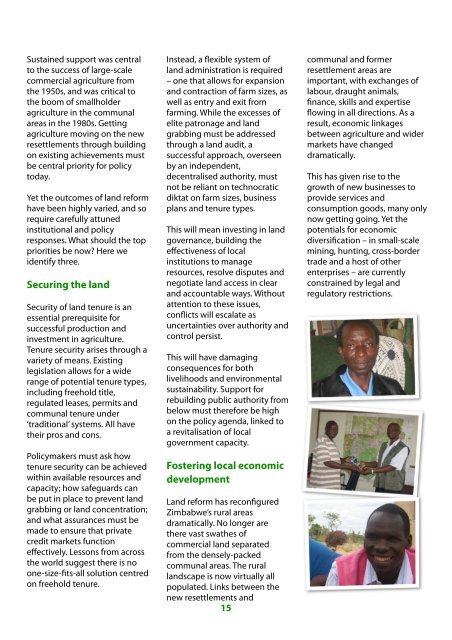Zimbabwe's Land Reform
Zimbabwe's Land Reform
Zimbabwe's Land Reform
You also want an ePaper? Increase the reach of your titles
YUMPU automatically turns print PDFs into web optimized ePapers that Google loves.
Sustained support was central<br />
to the success of large-scale<br />
commercial agriculture from<br />
the 1950s, and was critical to<br />
the boom of smallholder<br />
agriculture in the communal<br />
areas in the 1980s. Getting<br />
agriculture moving on the new<br />
resettlements through building<br />
on existing achievements must<br />
be central priority for policy<br />
today.<br />
Yet the outcomes of land reform<br />
have been highly varied, and so<br />
require carefully attuned<br />
institutional and policy<br />
responses. What should the top<br />
priorities be now? Here we<br />
identify three.<br />
Securing the land<br />
Security of land tenure is an<br />
essential prerequisite for<br />
successful production and<br />
investment in agriculture.<br />
Tenure security arises through a<br />
variety of means. Existing<br />
legislation allows for a wide<br />
range of potential tenure types,<br />
including freehold title,<br />
regulated leases, permits and<br />
communal tenure under<br />
‘traditional’ systems. All have<br />
their pros and cons.<br />
Policymakers must ask how<br />
tenure security can be achieved<br />
within available resources and<br />
capacity; how safeguards can<br />
be put in place to prevent land<br />
grabbing or land concentration;<br />
and what assurances must be<br />
made to ensure that private<br />
credit markets function<br />
effectively. Lessons from across<br />
the world suggest there is no<br />
one-size-fits-all solution centred<br />
on freehold tenure.<br />
Instead, a flexible system of<br />
land administration is required<br />
– one that allows for expansion<br />
and contraction of farm sizes, as<br />
well as entry and exit from<br />
farming. While the excesses of<br />
elite patronage and land<br />
grabbing must be addressed<br />
through a land audit, a<br />
successful approach, overseen<br />
by an independent,<br />
decentralised authority, must<br />
not be reliant on technocratic<br />
diktat on farm sizes, business<br />
plans and tenure types.<br />
This will mean investing in land<br />
governance, building the<br />
effectiveness of local<br />
institutions to manage<br />
resources, resolve disputes and<br />
negotiate land access in clear<br />
and accountable ways. Without<br />
attention to these issues,<br />
conflicts will escalate as<br />
uncertainties over authority and<br />
control persist.<br />
This will have damaging<br />
consequences for both<br />
livelihoods and environmental<br />
sustainability. Support for<br />
rebuilding public authority from<br />
below must therefore be high<br />
on the policy agenda, linked to<br />
a revitalisation of local<br />
government capacity.<br />
Fostering local economic<br />
development<br />
<strong>Land</strong> reform has reconfigured<br />
Zimbabwe’s rural areas<br />
dramatically. No longer are<br />
there vast swathes of<br />
commercial land separated<br />
from the densely-packed<br />
communal areas. The rural<br />
landscape is now virtually all<br />
populated. Links between the<br />
new resettlements and<br />
15<br />
communal and former<br />
resettlement areas are<br />
important, with exchanges of<br />
labour, draught animals,<br />
finance, skills and expertise<br />
flowing in all directions. As a<br />
result, economic linkages<br />
between agriculture and wider<br />
markets have changed<br />
dramatically.<br />
This has given rise to the<br />
growth of new businesses to<br />
provide services and<br />
consumption goods, many only<br />
now getting going. Yet the<br />
potentials for economic<br />
diversification – in small-scale<br />
mining, hunting, cross-border<br />
trade and a host of other<br />
enterprises – are currently<br />
constrained by legal and<br />
regulatory restrictions.

















